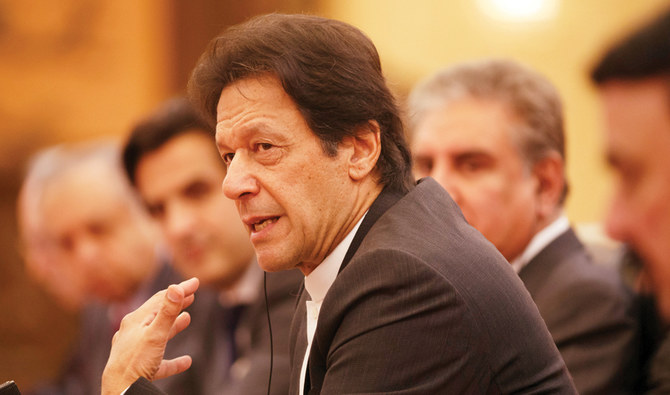ISLAMABAD: Pakistani Prime Minister Imran Khan defended his decision to make sweeping changes to his Cabinet on Friday, as analysts warned of a prolonged period of political uncertainty.
The reshuffle, announced late on Thursday night, comes just eight months into his party’s five-year term, and saw key appointments of political veterans widely criticized for their roles in previous administrations.
Khan said he had the right as leader of the country to remove anyone from office if they did not perform.
“I want to tell all ministers: Whoever isn’t beneficial for my country, I will bring (in) someone who is,” the former cricket star said at a rally in Orakzai in northwestern Pakistan. “If a player isn’t performing, we either change the batting order or we change him.
“The prime minister has one mission: To make his team win, and my mission is to lead my nation to victory. For that, I have changed the batting order of my team, and I will do again in the future.”
Abdul Hafeez Shaikh, the main beneficiary of the reshuffle, has been made finance minister. He previously held the role from 2010-2013 under the opposition Pakistan Peoples Party when it was in power, and was minister for privatization under former military ruler General Pervez Musharraf.
Khan also elevated Information Minister Fawad Chaudhry, another former Musharraf supporter. Chaudhry will now serve as minister for science and technology, while Firdous Ashiq Awan has replaced him at the Ministry of Information.
The reshuffle had been expected for weeks amid reports Khan had become disenchanted with Finance Minister Asad Umar over delays in securing a bailout package from the International Monetary Fund.
Inflation, at its highest for five years, has shocked many Pakistanis who voted for Khan. Pakistan’s central bank lowered growth forecasts last month, and the rupee has lost 35 percent of its value since December 2017.
But analysts warned the shakeup was ill-timed, and would not immediately improve the government’s performance or restore the public’s trust.
“This reshuffle may help settle some internal wrangling and power struggles in the ranks of the government, but in the long run it won’t have any positive impact on its performance,” journalist Zebunnisa Burki told Arab News. “The political chaos created by the reshuffle won’t raise much confidence.”
Columnist and political consultant Mosharraf Zaidi stated a reshuffle just eight months into the government’s term revealed a “dangerous lack of patience” on the part of the prime minister.
“The Cabinet assignments that have been moved around show a contempt for performance. If the problem was poor performance, then why were Cabinet members just reshuffled and not simply removed? This is (now) a government essentially of the Musharraf era.”
Umair Javed, a writer and sociology professor at the Lahore University of Management Sciences, said the changes had increased “political uncertainty.”
“This sudden and drastic change is not well received,” he said. “It seems like this was not a well thought out strategy … it shows the government itself is unsure about its long-term planning and strategy to deal with chronic issues like the economy.”
It was unfair to assess the performance of any ministry after a mere eight months, Javed added, especially when the government had promised major structural reforms to steer the country out of crisis.
“The government still has time to decide its direction,” he said. “Otherwise the people will have no choice but to pour onto the streets against it.”




























